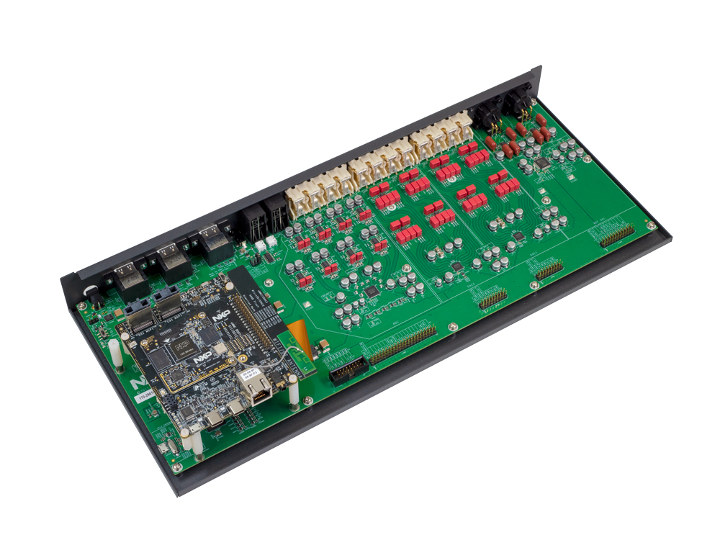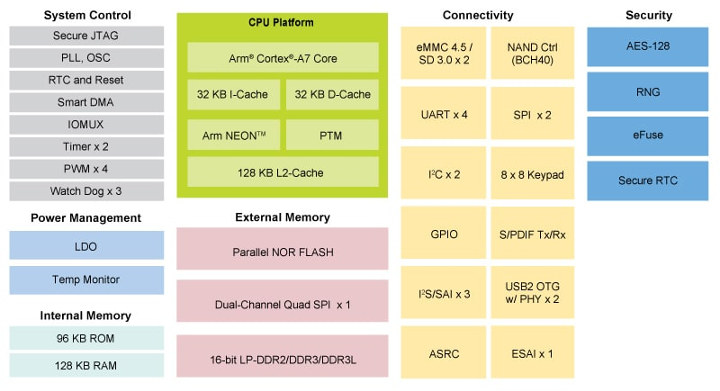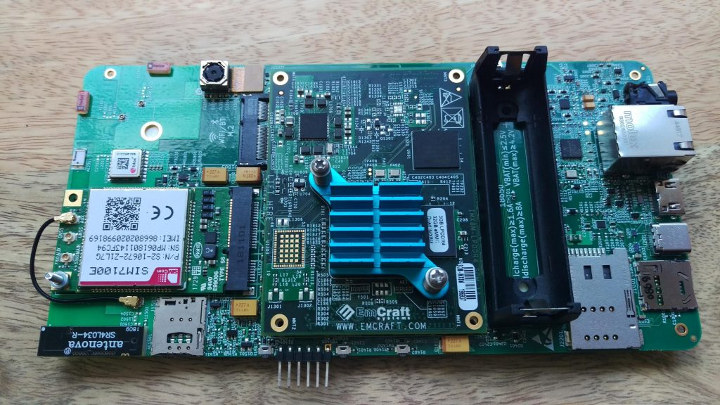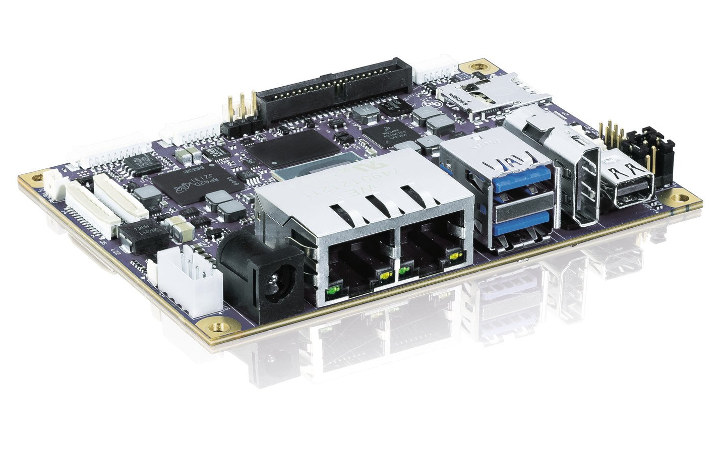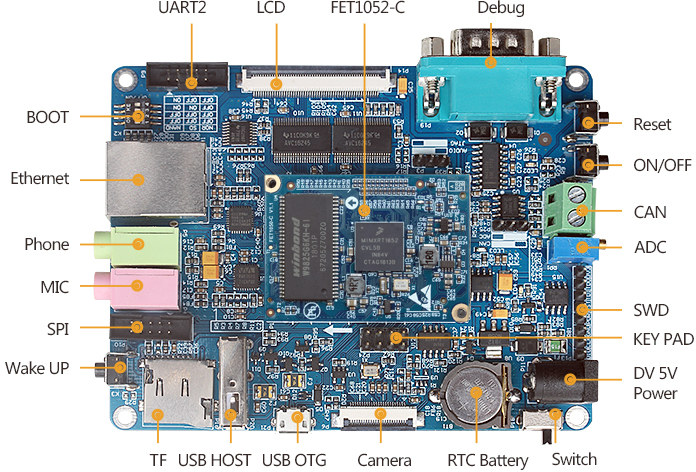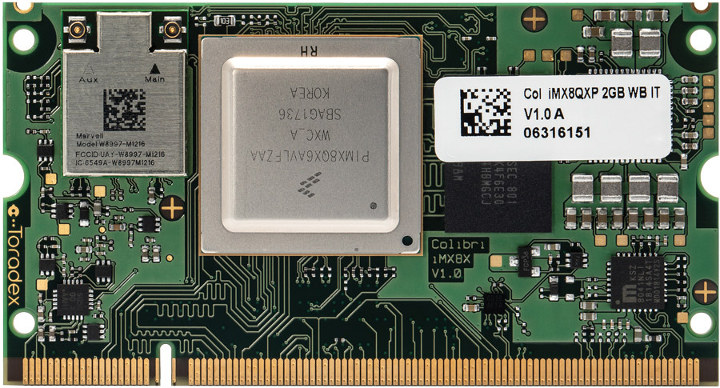High-fidelity audio systems such as soundbars, smart speakers, and AV receivers have traditionally relied on DSPs (Digital Signal Processors) to deliver low-latency audio processing, and enable audio and video synchronization. DSPs add to the cost of the overall design however, and with Immersiv3D technology, NXP has leveraged Arm Cortex-A53 and M4 cores in their NXP i.MX 8M Mini processor to completely remove the need for DSP in audio systems, shaving the BoM cost by up to 20% according to an article on EETimes. Immersiv3D also enables immersive audio support with Dolby Atmos and DTS:X, advanced audio pre/post processing, advanced features like voice control for the smart home. Immersiv3D audio solution was designed to help OEMs to bring to market affordable consumer audio devices with Dolby Atmos and DTS:X, and beside the audio processing software, NXP is also offering an Immersiv3D audio reference design to help them delelop sound bars based […]
Necunos NC_1 is a Pricey Open Source Linux “Phone” without Modem
Several weeks ago, I wrote about the upcoming “Necuno Mobile” phone made by a company called Necunos and running Linux on NXP i.MX6 Quad processor. The phone was supposed to be 100% open source hardware which all software and hardware resources to be made available publicly. There has been progress since then, as well as a name change since Necunos NC_1 is now up for pre-order for 1,199 Euros including VAT and international shipping with delivery promised in March 2019. Necunos NC_1 specifications are said to include: SoC – NXP i.MX 6Quad quad-core Arm Cortex-A9 processor with Vivante GPU System Memory – 1GB RAM Storage – 8 GB storage Display – 5″ touchscreen (attached or detached) Audio – 3.5mm audio jack, built-in microphone, and speaker Connectivity – 2.4 GHz 802.11 b/g/n WiFi Misc – Power, volume, and user programmable buttons USB – 1x micro USB port Battery – 3,500 mAh […]
NXP i.MX 6ULZ Cost Efficient Processor Drops Ethernet, Display, & Camera Interfaces
Freescale i.MX 6 processor was first announced in January 2011, and in the first few years I covered many products and development boards based on the single to quad core Cortex A9 processor. Further down the road, the company became part of NXP, and launched Cortex A7 variant such as i.MX 6ULL providing both lower costs and power consumption. But now, I usually skip new products based on i.MX6 because they are often just more of the same, and not really new worthy. But yesterday while writing about Linux 4.20 release, I realized I missed the announcement of i.MX 6ULZ processor similar to i.MX 6UL (UltraLight), but cost optimized for applications that do not require Ethernet, display, nor camera interfaces. NXP i.MX 6ULZ key features and specifications with differences with i.MX 6UL highlighted in bold or stricken-through: CPU – ARM Cortex A7 core @ up to 900 MHz with 128KB […]
Purism Librem 5 Linux phone development kits are now shipping
Purism Librem 5 is a privacy-focused open source Linux smartphone powered by NXP i.MX 8M processor that was launched via a crowdfunding campaign in August 2017 that ends up being extremely popular with over 1.5 million dollars raised. At the time, the phone was scheduled to ship on January 2019, but a $299 development kit with board, display and accessories was slated to ship in June 2018. There have been some delays, but the good news is that Librem 5 development kits are now shipping so third party software development for the phone will now really get started. Librem 5 development kit preliminary specifications: System-on-Module – Emcraft SOM-IMX8M module with NXP i.MX 8M Quad core Cortex A53 processor, at least 2GB LPDDR4 RAM and 16GB eMMC flash (I could not find exact RAM and storage capacities for the module used in the board) Display – 5.7″ LCD touchscreen with a […]
Kontron pITX-iMX8M Industrial Pico-ITX Motherboard is Powered by NXP i.MX8M Processor
We’ve had a fair amount of boards and modules based on NXP i.MX 8M dual or quad core Cortex A53 processor this year, including one pico-ITX motherboard with F&S Elektronik ArmStone MXM8 supporting up to 8GB RAM. Another i.MX 8M pico-ITX board will soon be launch courtesy of Kontron. pITX-iMX8M will also features the dual or quad core version of the processor, but will differ thanks to the presence of dual Gigabit Ethernet, mini DP and HDMI video outputs, an M.2 PCIe/USB 3.0 socket, and built-in TPM 2.0 security. Kontron pITX-iMX8M preliminary specifications: SoC – NXP i.MX 8M Dual or QuadLite Arm Cortex A53 processor @ up to 1.5 GHz, Arm Cortex-M4 real-time core, and Vivante GC7000Lite GPU with support for OpenGL/Es 3.1, OpenGL 3.0, Vulkan System Memory – 4GB LPDDR4 Storage – 64GB eMMC 5.1 flash, micro SD card / SIM slot combo Video Output – mini DisplayPort, HDMI […]
Necuno Mobile Open Source Linux Smartphone is Powered by NXP i.MX 6 Processor
A few years ago, various companies tried to develop other Linux based mobile operating systems, but most failed with Mozilla Firefox OS discontinued, Samsung Tizen is not being used in smartphones anymore, and Sailfish OS giving up the consumer market focusing on governmental and corporate customers instead. There’s still a niche market however for privacy-focused, open source Linux smartphones, and we’ve already covered NXP i.MX 8M based Purism Librem 5 smartphone scheduled to launch next year with GNOME based PureOS operating system, and the ability to switch to PureOS with KDE Plasma Mobile or Ubuntu Touch. Necuno Mobile will be another Linux smartphone based on an NXP processor, but instead of relying on a 64-bit i.MX 8M processor, it will be equipped with the older 32-bit i.MX 6Quad processor, and according to the company be “100% open source device, from metal to pixel, from hardware to software”. Necuno Mobile preliminary […]
Forlinx OK1052-C Board Features NXP i.MX RT1052 Crossover Processor
NXP i.MX RT series crossover processors were first announced last year as processors providing the same real-time capability as found in microcontrollers while providing performance similar to entry-level application processors thanks to an Arm Cortex-M7 core clocked at up to 600 MHz. i.MX RT series also lower BoM thanks to integrated PMIC and up to 512KB SRAM/TCM. Later on uCLinux for NXP i.MX RT1050 evaluation board was released, and a few months ago, we covered the upcoming VisionSOM-RT industrial system-on-module powered by the crossover processor. That means we did not have production-ready commercial solutions so far, but this has changed recently, with for example Forlinx Embedded OK1052-C board. The solution is comprised of a baseboard and a system-on-module with the following specifications: FET1052-C SoM SoC – NXP i.MX RT1052 single core Arm Cortex-M7 crossover processor @ up to 528 MHz with 512KB SRAM/TCM System Memory – 16MB or 32MB SDRAM […]
Toradex Colibri iMX8X SoM Features NXP i.MX 8X Dual / Quad Arm Cortex-A35 Processor
Designed for infotainment and dashboard in automotive applications, industrial control, robotics, healthcare, mobile payments, handheld devices, and more, NXP i.MX 8X Arm Cortex-A35 processor was first spotted in 2016, before being formally announced in March 2017. But it took quite longer to see actual products launched, and several vendors announced i.MX 8X modules in the last week while NXP also released documentation. One of them is Toradex with their Colibri iMX8X system-on-module with up to 2GB LPDDR4 memory, 8GB flash, a built-in 802.11ac 2×2 MIMO WiFi + Bluetooth 5 module, dual channel LVDS, MIPI DSI display interface, a quad-lane MIPI CSI-2 camera interface, etc… Toradex Colibri iMX8X specifications: SoC (one of the following options) NXP i.MX 8QuadXPlus quad core Cortex-A35 processor @ up to 1.2GHz, Arm Cortex-M4 MCU @ up to 266MHz, HiFi4 DSP, Vivante GC7000Lite performance optimized GPU, 4K video support NXP i.MX 8DualXPlus dual core Cortex-A35 processor @ […]


